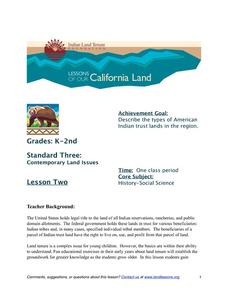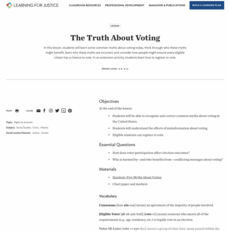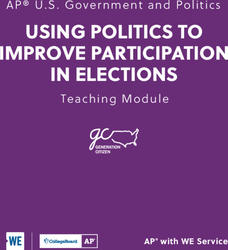Judicial Branch of California
Defining Civic Duty and Participation
A lesson, geared toward older elementary scholars, combines art with social studies to explain the purpose of civic duty and how to encourage others in the community to participate. Academics create advertising campaigns to promote civic...
Center for Civic Education
What Is Authority?
Young scholars examine the concepts of power and authority as they begin learning about government in this elementary social studies lesson. Through a series of readings, discussions, and problem solving activities, children learn about...
National Endowment for the Humanities
The "To Do List" of the Continental Congress
What is on your to-do list today? The second lesson of a three-part series on Lost Heroes of America investigates the laundry list of items in front of the second Continental Congress. Scholars research, analyze, and present information...
World History Digital Education Foundation, Inc.
COVID-19: Comparison with the Influenza Pandemic of 1918
A timely lesson uses documentation from the Spanish influenza pandemic of 1918 to compare it to the COVID-19 pandemic in 2020. Scholars watch a short video, analyze sources, complete a worksheet, and write a claim with supporting...
National Woman's History Museum
Women, Propaganda, and War
Governments rely on propaganda to build support for wars. Class members examine six propaganda posters, two each from the Spanish-American War, World War I, and World War II, and analyze how the way women were portrayed in the posters...
Indian Land Tenure Foundation
Indian Trust Lands
An important aspect of studying Native American history is understanding the nature of trust lands. Budding historians will learn that as Native Americans were removed from their home lands, trust lands were provided in the form of...
NPR
Partners In Winning The War Lesson Plan
How propaganda was used to change the concept of women's roles during World War II is the focus of an online exhibit provided by the National Women's History Museum. Packed with propaganda posters and pictures, the packet points out how...
Roy Rosenzweig Center for History and New Media
Reconstruction
When slavery ended, what did the government do to help African American during Reconstruction? An interesting instructional activity uses primary sources such as newspaper articles to help scholars analyze Reconstruction policies and how...
Teaching Tolerance
Critiquing Hate Crimes Legislation
The high school instructional activity explores what hate crimes are and how the government has responded to those crimes. Academics read legislation, analyze political cartoons, and complete hands-on-activities to understand what...
K20 LEARN
Whose Manifest Destiny? Westward Expansion
Your land is my land! Young historians investigate the concept of Manifest Destiny used by the United States government to justify western expansion. Jigsaw groups read primary source documents to gain an understanding of the movement...
John F. Kennedy Presidential Library & Museum
Military Advisers in Vietnam: 1963
How did the beginning of the Vietnam War factor into the Cold War with the Soviet Union? As part of a study of American involvement in Vietnam, class members read a letter address to President Kennedy and his response in which he...
Teaching Tolerance
The True History of Voting Rights
Explore what voting rights really are in an intriguing instructional activity that explores the history of American voting. The resource examines the timeline of voting rights in the United States with group discussions,...
PBS
Stereotypes vs. Statistics (Grades 4-8)
Stereotypes can be painful if they are used to discriminate against others. Statistics, however, can be helpful in dispelling myths propagated by stereotypes. Using a thoughtful lesson plan, scholars complete graphic organizers and...
Teaching Tolerance
The Truth About Voting
True or False: Only Presidential elections matter. Academics delve into common voting myths to understand what is true and why the election process is critical to democracy. The lesson uses group discussion, activities, and handouts to...
National Endowment for the Humanities
The Omnipotence of the Majority
While the American system is based on the idea of almost-universal suffrage for adults, great thinkers have had concerns about this system of governance. Using classic writings from Alexis de Tocqueville and videos highlighting thinkers...
PBS
Making Change: Revolutionary Tactics of the Civil Rights Movement
The film American Revolutionary: The Evolution of Grace Lee Boggs introduces viewers to the differing philosophies of and strategies employed by 1960s civil rights leaders such as Malcolm X and Martin Luther King, Jr. and the debate over...
Curated OER
How was the Constitution Used to Organize the New Government?
How did the United States Congress determine how the new president and vice president would be named when the nation was first established? Who would provide money for the government, and how would the executive branch be organized?
Center for History Education
Daily Lives of Slaves - What Really Happened?
The stories of enslaved people are preserved forever thanks to the Great Depression. Budding historians explore slave narratives gathered by a federal government initiative to discover what life was actually like for enslaved people....
Library of Congress
Stars, Stripes and Symbols of America: Comparing Our Flag, Past and Present
Your young historians will compare and contrast the details of the American flag today with an an image of the nation's flag from the post-Civil War era, and identify the flag's importance as a national symbol through analysis worksheets...
Annenberg Foundation
Egalitarian America
What does a true American represent? Scholars investigate the equal rights era of the 1960s and 1970s in the 20th installment of a 22-part series on American history. Using photographic, magazine, written, and video evidence, groups...
Judicial Learning Center
Civil Rights and Equal Protection
Almost every American is familiar with the Supreme Court case of Brown vs. Board of Education. Far fewer understand the constitutional reasoning or the wide-ranging consequences of the ruling in the field of criminology. The interesting...
C-SPAN
14th Amendment Equal Protection Clause
Two Supreme Court cases, Plessy v. Ferguson and Brown v. Board of Education take center stage in a lesson about the Equal Protection Clause of the 14th Amendment. Class members research both cases to compare and contrast the rulings.
College Board
Using Politics to Improve Participation in Elections
Instructors new to teaching AP U.S. Government and Politics classes, as well as seasoned veterans, will find this teaching guide an invaluable resource. Using a project-based approach to civics education, the lessons emphasize real-world...
Judicial Learning Center
The Judge and the Jury: Trial by Jury
Why is it so important to have a trial by jury in the American judicial system? This right is one of the hallmarks of American democracy, but it also comes with the responsibility of serving on a jury if called. Young legal scholars...

























